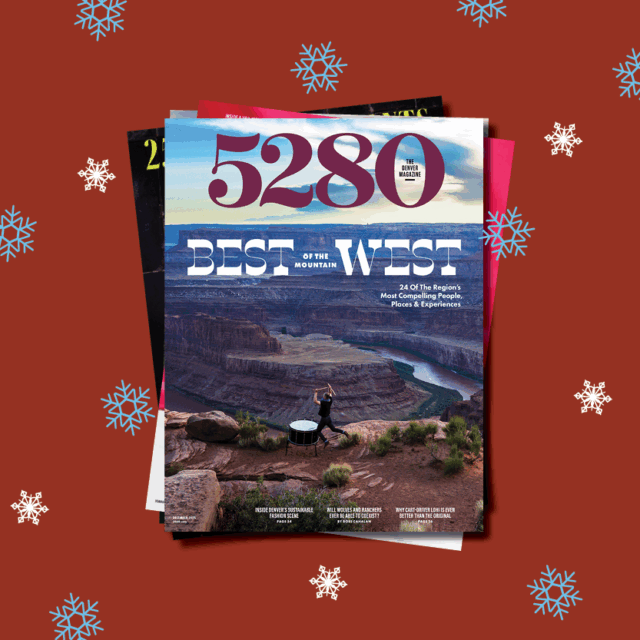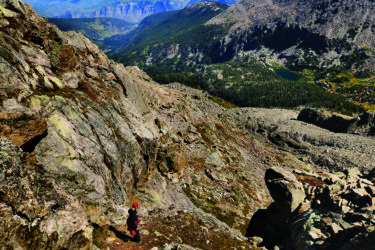The Local newsletter is your free, daily guide to life in Colorado. For locals, by locals.
The odds of summiting Denali are no better than a coin toss, but those who do it join a prestigious club–and guide service Mountain Trip has successfully helped roughly 2,000 people reach the highest point in North America during its 49-year history. Now, the Telluride-based outfitter is guiding adventurers to join an even more elite club: those who have skied off Denali’s summit.
On June 5, after nearly 20 years of back and forth with the National Park Service (NPS) about permitting unroped, guided ski descents on Denali, Mountain Trip led the first client on a commercial expedition in a decade to the top of the Alaskan peak—and subsequently skied down from the summit. The achievement “advances ski mountaineering guiding in the U.S.,” says Bill Allen, co-owner of Mountain Trip. “Denali is a big objective for people to dream about.”

Mountain Trip may make its home in the San Juans, but mountaineering expeditions in the Alaska Range—which arcs 600 miles around Anchorage, from the Alaska-Canada border to the Alaska Peninsula—are the reason the boutique guide service exists. In 1972, California-based climber Gary Bocarde heard rumors of untapped big wall opportunities in Alaska. In true dirt-bag fashion, Bocarde packed up his car and drove nearly 3,200 miles north to see if the tall tales were true.
They were. Massive, 5,000-foot cliff faces without recorded climbs awaited him in the Alaska Range. He began picking off peaks, including the first winter alpine ascent in that range when he summited Mt. Hunter. All the while, Bocarde was plagued by one problem: money. Or more accurately, a lack thereof. Leading novices in the mountains seemed like the obvious way to turn his passion into a profession, and in 1973 Mountain Trip was born.
Bocarde continued to lead or manage trips in Alaska until 2004, when he sold his business to Allen and Todd Rutledge. Under the new owners, Mountain Trip moved its headquarters to Colorado and expanded to lead expeditions around the world, including the highest peaks on each continent. “Denali is still core to what we do,” Rutledge says, noting that under his and Allen’s leadership, Mountain Trip has guided more routes and more climbers on Denali than any other outfitter.
Until recently, however, skiing down Denali wasn’t something the outfitter offered. Although independent, noncommercial groups have long been allowed to ski down the peak, the NPS has banned unroped glacier travel among commercial groups on Denali since the early 1980s. As a result, guided groups have had to be tied together with a rope when traveling above Denali’s “firn line,” where there’s usually snow. In theory, this requirement ensures that if one person loses firm footing on a slope or falls into a crevasse, those they’re tied to will self-arrest and (hopefully) act as a fall-preventing human anchor. There’s a downside though. “It’s really hard,” Rutledge says, “to ski tied in with someone else on a rope.”
In 2006, Rutledge and Allen approached the NPS with a request to allow unroped ski mountaineering. Their argument: There are situations and terrain in which it’s less risky to ski unroped than it would be to ski connected to the other members of one’s party. Rutledge says, for example, someone suffering from altitude sickness could get down the mountain faster on skis if they weren’t roped to other members of the expedition.

The NPS recognized the validity of Mountain Trip’s arguments in 2008 and offered the guide service provisional, verbal permission to ski mountaineer on Denali (which they did in 2009 and 2010). But the park service would not write the language into Mountain Trip’s contract, and the verbal permission was revoked in 2012. “The park’s position was basically that you’re always going to be safer if you’re roped up,” Rutledge says, “which put the kibosh on our ability to offer ski trips on Denali.”
Almost a decade later, in 2018, Rutledge and Allen made another push for formal approval. In addition to re-upping their claims about the safety of unroped glacier travel, they also highlighted advancements in ski equipment and the surge in popularity of backcountry skiing. The owners also pointed to the evolution of guiding as a highly regulated profession; before 2010 when dedicated training became the industry norm, many guides were essentially skilled recreationists leading trips as side hustles.
In 2019, after more dialogue with the park, the NPS finally wrote the permission into Mountain Trip’s contract. (That permission also extends to other guide services on the mountain.) But with COVID-19 decreasing travel over the past couple of years—and with Denali closed off entirely to guide services in 2020—Mountain Trip had yet to lead clients in a ski descent from the top.
The dream of a commercial group skiing off the summit was finally realized on June 5, when two Mountain Trip guides and their client donned skis, looked out over the white expanse below, and dropped off a peak that hadn’t been fully skied in more than 10 years. The trio was excited to see years of personal and collective effort come to fruition, but “it was a relatively quiet scene,” according to Jediah Porter, the trip’s lead guide. “All of us are fairly reserved personalities.”
Back in Colorado though, where Rutledge was following their progress on a satellite tracker, whoops of delight rang out. “I saw that the track did not retrace the route but dropped down off the summit of this 1,000-foot snowy face,” he says, a clear indication the group had been able to ski down the peak. (His exact words of elation included an expletive unfit for print.) Once he knew the team was safely back at camp, Rutledge says, “I felt like we’d broken a barrier. We’ve worked hard for this, and to see it happen—I was proud of them.”








